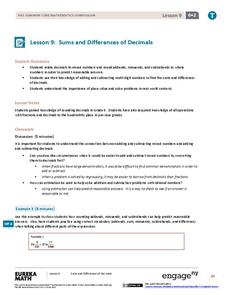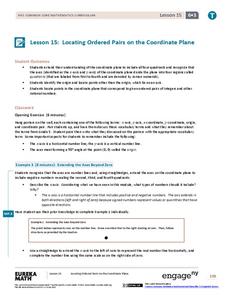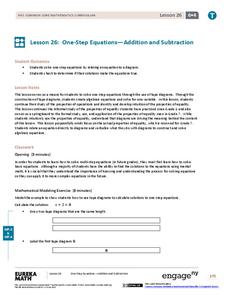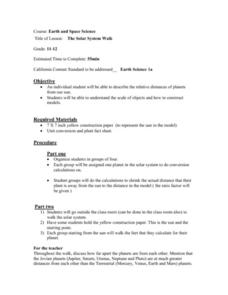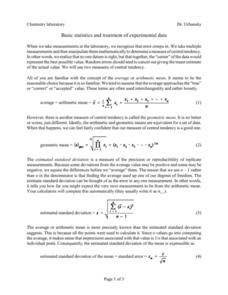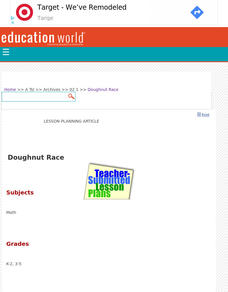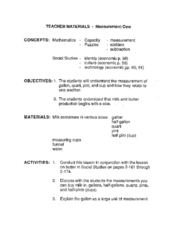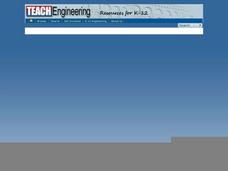EngageNY
Changing Scales
Pupils determine scale factors from one figure to another and the scale factor in the reverse direction. Scholars compute the percent changes between three figures.
EngageNY
Estimating Probabilities by Collecting Data
Take a spin to determine experimental probability. Small groups spin a spinner and keep track of the sums of the spins and calculate the resulting probabilities. Pupils use simulated frequencies to practice finding other probabilities to...
EngageNY
Comparison Shopping—Unit Price and Related Measurement Conversions
Speed up your scholars' understanding of ratios. Class members compare ratios related with speeds presented in different representations. They then use the unit rates to make the comparisons.
EngageNY
Sums and Differences of Decimals
Sometimes dealing with decimals is so much easier than dealing with fractions. The ninth lesson in a 21-part module has the class consider situations when it might be easier to add or subtract fractions by first converting to decimals....
EngageNY
Ratios II
Pupils continue the study of ratios by creating ratios from a context. The contexts present more than two quantities, and scholars create contexts that match given ratios.
EngageNY
Locating Ordered Pairs on the Coordinate Plane
Four quadrants, four times the fun. Future mathematicians learn the terminology associated with the coordinate plane and how to plot points in all four quadrants. A worksheet tests their understanding of the material in the 16th...
EngageNY
The Opposite of a Number
It's opposite day! The fourth installment of a 21-part module teaches scholars about opposites of integers and of zero. Number lines and real-world situations provide an entry point to this topic.
EngageNY
Writing Addition and Subtraction Expressions
Symbols make everything so much more concise. Young mathematicians learn to write addition and subtraction expressions — including those involving variables — from verbal phrases. Bar models help them understand the concept.
EngageNY
Writing Division Expressions
Express division using different expressions. Individuals learn to write division expressions both with and without the division symbol in the 13th lesson of a 36-part series. They consider both numerical and algebraic expressions...
EngageNY
One-Step Equations—Addition and Subtraction
Just one step is all you need to find success in solving equations. The 27th installment in a series of 36 teaches how to solve one-step equations involving addition and subtraction. Tape diagrams help future mathematicians in this task.
EngageNY
More Practice with Box Plots
Don't just think outside of the box — read outside of it! The 15th lesson in a 22-part unit provides pupils more work with box plots. Learners read the box plots to estimate the five-number summary and interpret it within the context....
EngageNY
Writing and Graphing Inequalities in Real-World Problems
Inequalities: when one solution just doesn't suffice. Individuals learn to write inequalities in real-world contexts and graph solution sets on the number line. All inequalities in the lesson are of the form x < c or x < c.
Curated OER
The Solar System Walk
A unique lesson on the solar system, and some of the mathematics associated with it, is here for your high schoolers. Pupils are put into groups of four, and each group is assigned one of the planets from our solar system. They must...
Curated OER
Basic Stats
In this chemistry worksheet, students focus upon the concepts of mean and standard deviation and how it is used in the laboratory to interpret data.
Project Maths
Complex Number Operations
What do animated videos have to do with mathematics? Using operations of complex numbers and their representations on the complex plane, high schoolers observe how mathematics could be used to move animations. The lesson provides an...
Curated OER
A Different Point of View
Elementary schoolers utilize a pattern worksheet embedded in this plan to work on a deeper understanding of geometric concepts like symmetry and congruency. Since geometry is such a visual form of mathematics, this lesson should fit...
Curated OER
Doughnut Race
Pupils will practice math facts in this fast-paced and fun "Doughnut Race." This fun activity has learners practice their math facts in a face paced game environment. It can be adapted to all mathematical operations by using a poster...
Curated OER
Measurement Cow
After a class discussion that revolves around the measurements that most milk cartons come in, learners dig deeper to understand the mathematical relationships between these units of measurement. A very cute, and quite-effective...
Curated OER
To the North: A Black Family Leaves Arkansas to Find Work in Michigan
Upper elementary and middle school scholars study the economic factors that caused so many Arkansans to migrate to different parts of the country looking for work. Use this history lesson plan to help your charges gain a better...
Curated OER
Crazy for Cubes: Art and Science
Learners discuss Sol LeWitt and conceptual art, then analyze the differences in expressing a concept through model-based inquiry and aesthetic art criticism. They develop a geometric, scientific, or mathematical concept, then create an...
Curated OER
Paper Cranes
Paper folding is a great art form that can be incorporated into cultural, mathematic, and art lessons. This resource includes the full instructions needed to fold a paper crane, as well as a Haiku poetry idea. Tip: This activity would be...
Curated OER
Design Your Dream Stadium
Students raise their design awareness about construction considerations for large public facilities including safety, accessibility, funding, construction materials, and space, use geometry and other mathematical skills to calculate size...
Curated OER
Magical Math-ical Dragon
Students read picture books in which mathematics and solutions to math problems play a role in the action. After discussing the books and how the author used math problems to tell a story, they create their own magical, math-ical story...
Teach Engineering
May the Magnetic Force Be with You
Class members use mathematics in order to better understand magnetic forces and their interaction on charged particles. After a demonstration of the interaction between a magnet and an electron beam using a CRT computer monitor, learners...
Other popular searches
- History of Mathematics
- Discrete Mathematics
- Mathematics Line Symmetry
- Everyday Mathematics
- Montessori Mathematics
- Writing in Mathematics
- Mathematics Mode and Median
- Applied Mathematics
- Mathematics Times Tables
- Christmas Mathematics
- B Ed Mathematics
- Discrete Mathematics Graph





